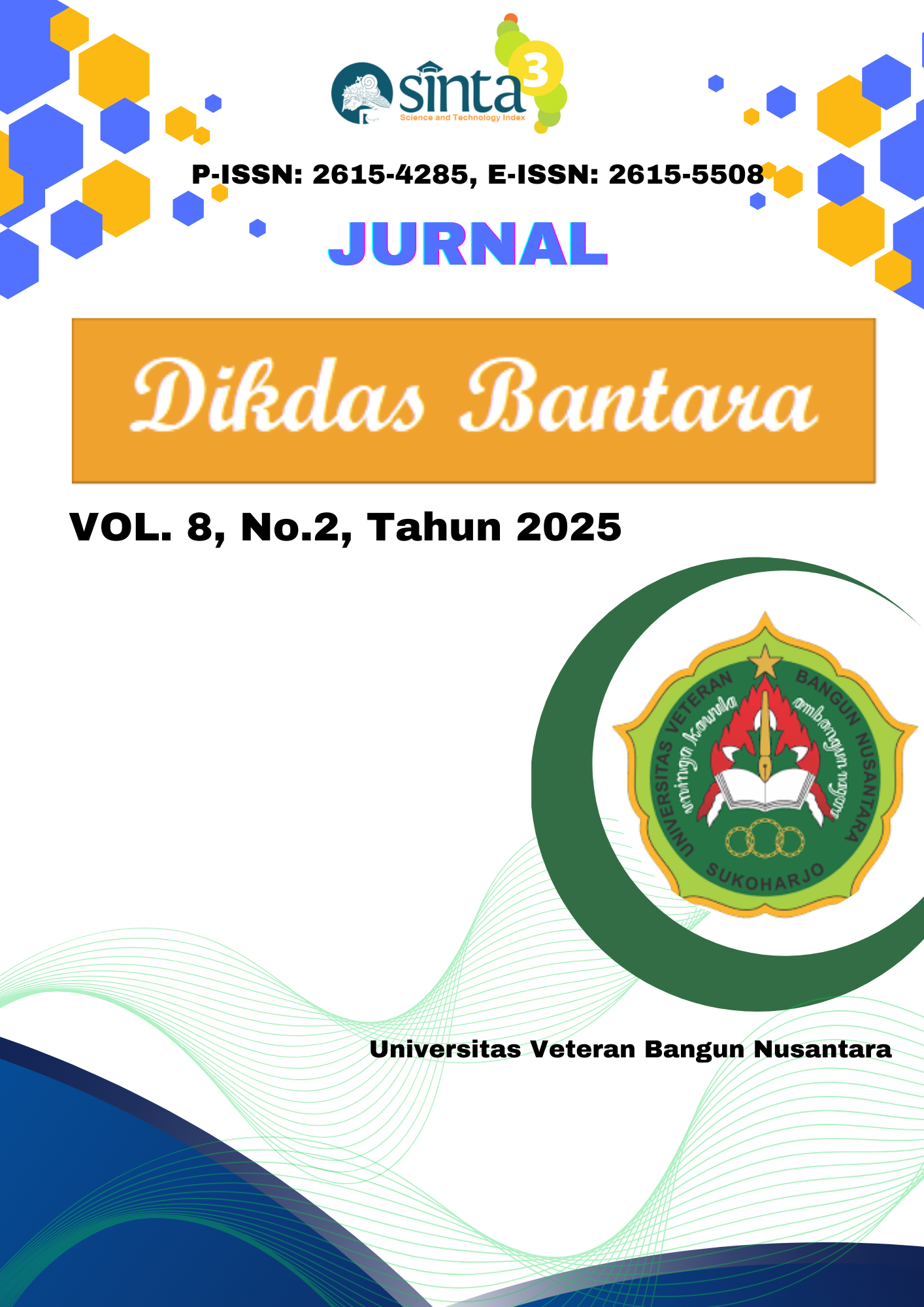Inggris
DOI:
https://doi.org/10.32585/dikdasbantara.v8i2.7169Abstrak
Pembelajaran matematika di sekolah dasar sering kali menghadapi tantangan dalam meningkatkan pemahaman konseptual peserta didik, khususnya pada materi pecahan. Guru kelas V Sd Negeri 61 Kota Banda Aceh yaitu Ibu N pada sesi wawancara mengatakan bahwasanya pada saat proses belajar mengajar di dalam kelas, guru masih cenderung menggunakan pembelajaran dengan metode ceramah seperti yang digunakanan pada umumnya sehingga proses belajar mengajar didalam kelas terjadi konvensional dan kurangnya kreaftif selama pembelajaran, peserta didik tidak mampu untuk mengimplementasikan kedalam kehidupan nyata. Pendekatan Realistic Mathematics Education (RME) memberikan solusi dengan cara menghubungkan konsep matematika dengan konteks kehidupan nyata, sehingga mempermudah peserta didik dalam memahami dan menerapkan konsep pecahan secara lebih bermakna. Penelitian ini bertujuan untuk menganalisis implementasi model RME dalam pembelajaran pecahan serta pengaruhnya terhadap pemahaman konseptual peserta didik sekolah dasar. Metode penelitian yang digunakan adalah penelitian eksperimen kuasi dengan desain pretest-posttest control group. Subjek penelitian terdiri dari peserta didik kelas V sekolah dasar yang dibagi menjadi kelompok eksperimen (dengan RME) dan kelompok kontrol (dengan metode konvensional). Instrumen penelitian mencakup tes pemahaman konseptual, observasi, dan wawancara untuk memperoleh data kuantitatif dan kualitatif. Hasil penelitian menunjukkan bahwa peserta didik yang belajar dengan pendekatan RME mengalami peningkatan pemahaman konseptual yang lebih signifikan dibandingkan dengan peserta didik yang belajar menggunakan metode konvensional. Pembelajaran berbasis RME dapat membantu peserta didik dalam mengonstruksi konsep pecahan melalui eksplorasi situasi kontekstual, diskusi kelompok, dan refleksi terhadap strategi penyelesaian masalah. Maka dengan menggunakan pendekatan ini dapat menjadi strategi efektif dalam meningkatkan kualitas pembelajaran pecahan di sekolah dasar.
Unduhan
Unduhan
Diterbitkan
Terbitan
Bagian
Lisensi
Hak Cipta (c) 2025 Rita Yusari , Rita Novita, Syarfuni, Siti Mayang Sari

Artikel ini berlisensiCreative Commons Attribution-ShareAlike 4.0 International License.
The copyright to this article is transferred to Jurnal DIKDAS BANTARA if and when the article is accepted for publication under Creative Commons Attribution-ShareAlike 4.0 International License. The undersigned hereby transfers any and all rights in and to the paper including without limitation all copyrights to Jurnal Komunikasi Pendidikan. The undersigned hereby represents and warrants that the paper is original and that he/she is the author of the paper, except for material that is clearly identified as to its original source, with permission notices from the copyright owners where required. The undersigned represents that he/she has the power and authority to make and execute this assignment.
We declare that:
1. This paper has not been published in the same form elsewhere.
2. It will not be submitted anywhere else for publication prior to acceptance/rejection by this Journal.
3. A copyright permission is obtained for materials published elsewhere and which require this permission for reproduction.
Furthermore, I/We hereby transfer the unlimited rights of publication of the above mentioned paper in whole to Jurnal Komunikasi Pendidikan. The copyright transfer covers the right to reproduce and distribute the article, including reprints, translations, photographic reproductions, microform, electronic form (offline, online) or any other reproductions of similar nature. The corresponding author signs for and accepts responsibility for releasing this material on behalf of any and all co-authors. After submission of this agreement signed by the corresponding author, changes of authorship or in the order of the authors listed will not be accepted.
Retained Rights/Terms and Conditions
1. Authors retain all proprietary rights in any process, procedure, or article of manufacture described in the work.
2. Authors may reproduce or authorize others to reproduce the work or derivative works for the author’s personal use or for company use, provided that the source and the Jurnal Komunikasi Pendidikan copyright notice are indicated, the copies are not used in any way that implies Jurnal Komunikasi Pendidikan endorsement of a product or service of any employer, and the copies themselves are not offered for sale.
3. Although authors are permitted to re-use all or portions of the work in other works, this does not include granting third-party requests for reprinting, republishing, or other types of re-use.












